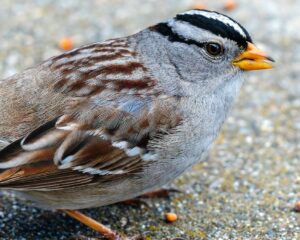 With luck, you might find some time on a warm, calm evening to watch the world welcome the autumn season. I was recently able to sit for a while along the river, looking and listening as the light began to fade. It was warm enough that crickets were singing- field and mole, giving a sort of dreamy background score to the evening. Wildflowers are still abundant- goldenrod, white snakeroot, coneflowers, and mints, even some spring bloomers fooled into flowering by the changing day length. Cardinals were chipping as they do constantly from the bushes, eventually joined by White-crowned sparrows uttering a similar call – not the romance-fueled songs of spring and summer, just a constant series of chips from both of them. The sparrows are migrants, and as time went on their calls became more numerous, then diminishing as it became dark. I’m sure some of them took flight for the night to continue their fall journey to warmer places, while others stayed to fuel up on the many berries and insects available to them this time of year. They seem to become excited- I’m wondering if they are working up the nerve to fly far to the next safe resting place.
With luck, you might find some time on a warm, calm evening to watch the world welcome the autumn season. I was recently able to sit for a while along the river, looking and listening as the light began to fade. It was warm enough that crickets were singing- field and mole, giving a sort of dreamy background score to the evening. Wildflowers are still abundant- goldenrod, white snakeroot, coneflowers, and mints, even some spring bloomers fooled into flowering by the changing day length. Cardinals were chipping as they do constantly from the bushes, eventually joined by White-crowned sparrows uttering a similar call – not the romance-fueled songs of spring and summer, just a constant series of chips from both of them. The sparrows are migrants, and as time went on their calls became more numerous, then diminishing as it became dark. I’m sure some of them took flight for the night to continue their fall journey to warmer places, while others stayed to fuel up on the many berries and insects available to them this time of year. They seem to become excited- I’m wondering if they are working up the nerve to fly far to the next safe resting place.Herons squawk down by the river- a couple of great blues moving to their roosting places, and then a green heron flying by singing its “keoww” notes. After passing, another responds and flies to meet the first- then they together fly off to their roost as well. A kingfisher rattles one last time before finding the right limb for the night. In the shallows of the river there are a few large fish- salmon? steelhead?- I’m not sure, but they splash energetically.
A bald eagle calls from a roost upstream as it does every night. I’m sure he or she was watching the same fish with thoughts of dinner.
And then, a couple of funny, harsh calls. Two different birds, constantly moving. Short, “eepish” kind of calls- young great horned owls. They are probably still begging for food from their parents, who I can only imagine must be really tired of that after listening to their begging since spring. Their begging won’t be rewarded much longer- their parents will soon be courting before nesting again in a few months. A screech owl also sings nearby on the riverbank, then another calls in the distance. Briefly, a barred owl calls from the woods across the river. All of them are likely year-round residents, although the young ‘horneds will likely have to find another territory away from their parents.
Lastly, a small bat flutters by- something that we don’t see nearly as much as years ago. He or she is also either migrating, or looking for a subterranean space for the winter, where it’s cool but not too cold. Each animal has its own strategy for coping with changing seasons, a multitude of amazing strategies.
I’m glad I was able to spend some time at the end of a busy day. As my day, and that of the other daytime creatures winds down, it begins for just as many others. It’s always good to appreciate that.
Photo- white-crowned sparrow by Frank Cone
